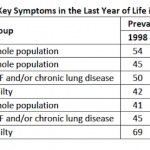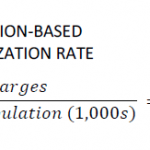By Joanne Lynn In late January, Department of Health and Human Services Secretary Sylvia Matthews Burwell announced that Medicare would purchase most services on the basis of value rather than volume, aiming for 90% of fee-for-service payments by 2018 [http://www.hhs.gov/blog/2015/01/26/progress-towards-better-care-smarter-spending-healthier-people.html]. Of course, paying on the basis of value is much better than paying on the […]

by Adam Singer Symptoms such as pain and confusion are very distressing for those nearing the end of life and their families. That’s why increasing attention to end-of-life care is spurring greater interest in alleviating such symptoms as a critical component of quality of life. Yet there is still a long way to go: a […]
By Elizabeth Rolf Take a look at the Swedish national dashboard for eldercare. It’s a great model. An analytics approach that works, Senior Alert (http://plus.lj.se/senioralert) takes the preventive care of every individual patient and inputs the data outcomes in a quality dashboard for each municipality, accessible to doctors, patients, and the public. The civic leader […]

by Stephen F. Jencks, M.D., M.P.H. [Also see companion post by Joanne Lynn, M.D.] Issue. The Medicare Readmission Reduction Program (MRRP) encourages hospitals to reduce readmissions within 30 days of discharge by imposing substantial financial penalties on hospitals with more readmissions than would be expected if the same patients were discharged from an average hospital.[1] […]

By Joanne Lynn M.D. [Also see companion post by Stephen F. Jencks, M.D., M.P.H.] Care transitions improvement programs have been effective in helping the health care system both become more effective in serving people living with serious chronic conditions and reduce costs. However, the key metric used to measure performance is seriously malfunctioning in at […]
By Joanne Lynn What matters in the lives of frail elders centers on function — and understanding an elderly person’s course, over time, requires that everyone involved learn to measure functioning in the same way. That’s the core of the new Improved Medicare Post-Acute Care Transformation (IMPACT) Act, passed by Congress in September 2014. Within […]
By Joanne Lynn and Steve Jencks Work to reduce readmissions has started to yield remarkable improvements in integration of care for frail elderly people – by prompting hospital personnel to talk with community-based service providers, by teaching patients and families how to manage conditions and navigate the health care system more easily, and by paying […]
by Janice Lynch Schuster Age-related issues, including family caregiving, must become integral to the domestic policy agenda. Until now, they have received lip service. But here’s our opening to push for real conversation: The Obama Administration has declared a domestic policy focus on improving the lives of working families. At a June White House Summit […]
by Anne H. Montgomery and Joanne Lynn, MD, MA, MS Congress is gearing up to put a legislative glide path in place that is intended to culminate in major reform of Medicare’s post-acute care (PAC) payment system. Following several months of soliciting and reviewing comments on a discussion draft, the “Improve Medicare Post-Acute Care Transformation […]
Closing the Care Gap for Families in the 21st Century In early July, Sen. Bob Casey (D-PA) will introduce a novel policy proposal that could be life changing for the millions of Americans who quietly worry and wonder who they can call on for help and steady companionship when a loved one becomes ill, disabled, […]
